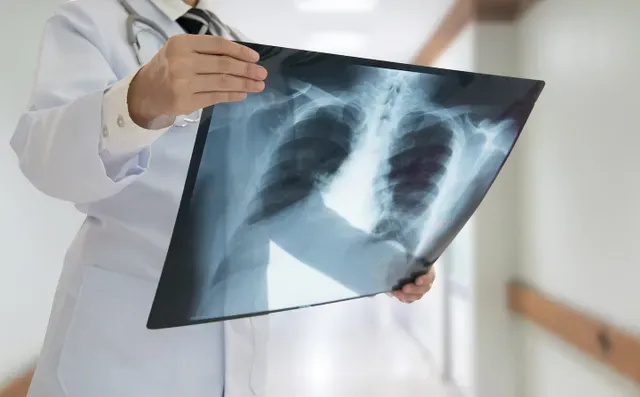Pulmonary Health and Wellness
Your primary care provider is not just your health liaison but also your key resource for pulmonary health and wellbeing. This is particularly vital for patients grappling with respiratory disorders like shortness of breath. At Nirvana Healthcare Management Services, our medical partners offer comprehensive and holistic care for all things related to pulmonary medicine. Our network of physicians is well-versed in handling diseases from the lower respiratory system and appreciates the intricate connection between the heart and lungs. They adopt a preventative stance towards pulmonary care, emphasizing lung health.
Pulmonary care zeroes in on diseases that take place in the respiratory system. This encompasses the lungs, chest, thoracic cavity, and upper airways. Using a multidisciplinary team approach, our physicians acknowledge the symbiotic relationship between airways, muscles, and the circulatory system. They have a deep understanding of various lung disorders, including conditions impacting the lung parenchyma and pleura. Additionally, they are adept at identifying and preventing environmental and work-related causes of lung disease.
While risk assessment and prevention are central to this branch of medicine, our physicians possess the expertise to help patients manage a wide array of respiratory illnesses and disorders, such as chronic obstructive pulmonary disease, interstitial lung disease, pulmonary hypertension, and lung cancer. For instance, individuals with asthma often experience inflammation in their lung’s airways, which constricts these vessels, impairing lung function during exhalation.
To aid in disease management and early detection, our team uses lung function tests and pulmonary function tests. These tests are crucial in diagnosing conditions like chronic cough and assessing the overall health of the lungs. The goal is to ensure optimal pulmonary care, keeping your lungs healthy and functioning at their best.
Chronic Cough: This persistent cough, lasting over eight weeks, is a common respiratory condition. It may come with other symptoms like shortness of breath, wheezing, runny nose, and heartburn. Several factors, including lung conditions and environmental factors like air pollution, could contribute to a chronic cough.
Chronic Obstructive Pulmonary Disease (COPD): This chronic condition progressively hampers airflow, making breathing difficult and worsening over time. COPD, a serious illness often linked to cigarette smoking, usually encompasses chronic bronchitis and emphysema, though the severity of these diseases varies from person to person.
Emphysema: This lung condition damages the alveoli or air sacs in the lungs, leading to larger air spaces that reduce the lung’s surface area and the amount of oxygen entering the bloodstream. This results in shortness of breath and diminished pulmonary function.
Lung Cancer: This critical condition starts in the lungs but can metastasize to other organs like the brain. Sometimes, cancer from other organs can spread to the lungs. The two primary types, small cell and non-small cell (more common) determine treatment plans. Imaging tests such as a CT scan are used for diagnosis.
Pulmonary Fibrosis: This group of lung diseases hardens and thickens lung tissue, preventing it from expanding properly. As a result, patients experience trouble breathing and a decrease in vital capacity.
Occupational Lung Issues: Work-related lung disorders like black lung disease, also known as coal workers’ pneumoconiosis, occur due to prolonged exposure to harmful substances like coal dust or asbestos. This damages the lungs and obstructs breathing.
Tuberculosis: This contagious disease primarily affects the lungs but can also harm the brain, spine, and kidneys. Symptoms of active tuberculosis include coughing up blood or mucus, persistent cough for several weeks, and chest pain.
Symptoms of Pulmonary Disease
The medical team at Nirvana Healthcare Management Services understands the significance of providing tailored and continuous healthcare, particularly in pulmonary medicine. Several signs might indicate potential respiratory conditions, suggesting that an individual may be dealing with a lung disease or disorder.
If you’re experiencing any of these symptoms, we recommend scheduling an appointment with our patient coordinator:
- A chronic cough persisting for over three weeks
- Chronic bronchitis or a severe cold affecting your breathing
- Difficulty breathing, especially after light physical activity
- Feeling dizzy, lightheaded, or fainting
- Uncontrolled asthma attacks or uncertainty about their triggers
- Chest pain or tightness
- Fatigue
- Wheezing
These symptoms could be indicative of serious illnesses like chronic obstructive pulmonary disease (COPD), interstitial lung disease, or even lung cancer. They could also be associated with risk factors such as cigarette smoking and exposure to air pollution.
Diagnosing Lung Disorders
Our healthcare providers utilize a range of assessments to evaluate a patient’s risk and diagnose specific lung conditions. These include pulmonary function tests (PFTs) and lung function tests, designed to assess the lungs’ vital capacity and identify any trouble breathing. We also conduct imaging tests, like CT scans, to get a detailed view of lung tissue and detect any abnormalities.
For patients experiencing shortness of breath, we offer shape tests to differentiate between cardiac and pulmonary causes. Sleep studies are also available to diagnose conditions like obstructive sleep apnea. At Nirvana Healthcare Management Services, our focus is on maintaining your pulmonary health, managing chronic conditions, and ensuring your respiratory system functions at its optimal level.
Risk Factors
Lung conditions can affect anyone, but certain factors increase the risk for some individuals more than others, such as:
- Age: As a person gets older, the likelihood of developing lung diseases increases.
- Genetics: A family history of lung disease can increase the risk of developing similar conditions.
- Smoking: Both active smoking and exposure to second-hand smoke are significant risk factors for Chronic Obstructive Pulmonary Disease (COPD) and other lung disorders.
- Long-term exposure to lung irritants: Prolonged exposure to substances that irritate the lungs, such as certain chemicals, dust, or fumes, can lead to conditions like COPD.
- Respiratory infections: Frequent respiratory infections, especially during childhood, may contribute to lung damage and increase the risk of COPD.
- Certain medications: Some medicines can raise the risk of respiratory failure.
- Underlying conditions: Certain conditions, such as asthma, can increase the likelihood of developing other lung disorders.
Treatment Plans
Given the diversity of pulmonary diseases, approaches to diagnosis and treatment can vary based on the severity and underlying causes of these conditions. However, some common strategies that healthcare providers may recommend for managing respiratory issues include:
- Medication: While many lung disorders like chronic obstructive pulmonary disease (COPD), interstitial lung disease, and pulmonary hypertension are often incurable, doctors can prescribe medications to help manage symptoms. For instance, inhalers can be used to improve lung function and alleviate trouble breathing.
- Pulmonary Rehabilitation: This therapy is specifically designed for those with chronic respiratory problems, such as COPD, that diminish their quality of life. In these programs, patients learn effective breathing techniques, receive exercise strategies to maintain physical activity levels and get nutritional guidance to support overall lung health.
These treatment options are typically recommended based on results from various tests, including lung function tests, pulmonary function tests, and imaging tests like CT scans. These assessments help doctors evaluate the vital capacity of the lungs, the condition of the lung tissue, and the presence of any serious illnesses like lung cancer.
Ways to Improve Your Respiratory Health
Fortunately, there are proactive steps you can take to bolster your pulmonary health and reduce the risk of developing these conditions. Here, we present a list of effective strategies that can help enhance your lung function, manage existing lung conditions, and promote a healthier respiratory system. Whether you’re seeking preventive measures or ways to manage a chronic condition, these tips are designed to support your journey toward better respiratory health.
Don’t Smoke: Quitting smoking is the best way to prevent lung diseases like chronic obstructive pulmonary disease (COPD) and lung cancer. Even if you’re dealing with a chronic condition like interstitial lung disease, stopping smoking can help manage symptoms.
- Avoid Exposure to Air Pollutants: Air pollution can damage lung tissue and exacerbate respiratory conditions. Try to minimize exposure to harmful pollutants as much as possible.
- Get Regular Check-ups: Regular visits to your primary care doctor or a specialist in pulmonary medicine can help detect any potential lung disorders early. Lung function tests and imaging tests such as CT scans may be part of these check-ups.
- Exercise Regularly: Physical activity strengthens the respiratory system, improves lung function, and increases vital capacity. Incorporating regular exercise into your treatment plan can help manage conditions like pulmonary hypertension.
- Practice Diaphragmatic Breathing: This form of deep breathing can help improve lung function and ease trouble breathing.
- Stay Hydrated: Proper hydration helps keep the mucosal linings in the lungs thin, which helps improve lung function.
- Maintain a Healthy Diet: A balanced diet supports overall health, including lung health. Certain nutrients may even help protect against serious illnesses like lung cancer.
- Use Protective Gear: If you work in an environment with airborne pollutants or irritants, use appropriate protective gear to prevent lung conditions.
- Pulmonary Rehabilitation: This therapy, which often includes exercises and education, can help individuals with chronic respiratory problems improve their quality of life.
- Add an Air Purifier to Your Environment: An air purifier can reduce the number of harmful particles in the air, potentially easing symptoms of asthma and other respiratory conditions.
Remember, managing respiratory health is a long-term commitment, and it’s essential to work closely with your healthcare provider to create a personalized plan. In addition to these tips, critical care may be necessary for those with severe lung diseases or disorders.
Reach Out to a Provider from Nirvana Healthcare Management Services
Discover proactive medicine at Nirvana Healthcare Management Services in Essex County, NJ. Get a comprehensive understanding of your health with our pulmonology risk assessments. Conveniently located in Newark and East Orange, NJ, our network includes Salerno Medical Associates, Metropolitan Medical Group, Roseville Medical Society, North Ward Medical Arts, and Armenti Medical Group. We also offer in-home services for seniors through CHOP. Take charge of your pulmonary health and wellness. Contact us now to schedule an appointment.

